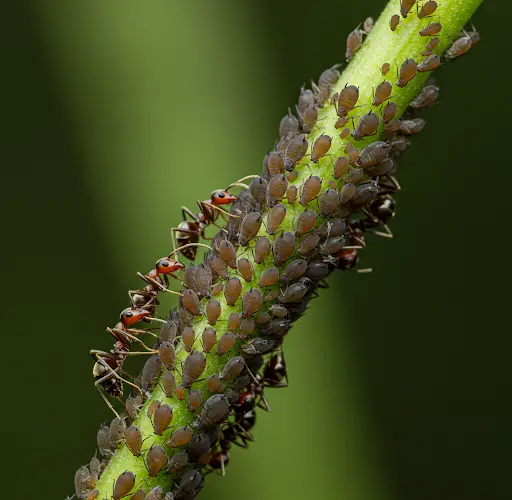Aphids in the Garden: A Natural Solution to Protect Your Plants
If you’ve ever walked through your garden and noticed tiny insects clustered on your plant leaves, chances are you’ve encountered aphids. These small pests may seem harmless at first glance, but they are among the most destructive garden invaders. Aphids feed by sucking sap from plants, weakening them, distorting new growth, and transmitting viruses. If left unchecked, they can quickly spread and cause significant damage to vegetables, fruits, herbs, and even flowers.
Fortunately, there’s no need to resort to harsh chemicals. With a simple, natural homemade spray, you can get rid of aphids effectively while preserving the health of your garden ecosystem. This method is safe for beneficial insects such as bees and ladybugs, which play an important role in pollination and pest control.
Understanding Aphids and Their Behavior
Aphids are small, soft-bodied insects that vary in color — green, yellow, black, brown, red, or even pink. Some species can even change color to blend into their environment, making them harder to spot and helping them avoid predators. Aphids usually target the tender parts of plants, such as new shoots, flower buds, and the undersides of leaves.
One fascinating aspect of aphid behavior is their symbiotic relationship with ants. Aphids secrete a sugary substance known as honeydew, which attracts ants. In return, ants “guard” the aphids from natural predators like ladybugs and lacewings, ensuring the colony remains safe and continues to produce honeydew.
This protective relationship makes aphid control even more important — as colonies grow and ants join in, the balance in your garden can shift quickly. Left unmanaged, aphids can reduce plant vigor, cause stunted growth, and lead to poor harvests.
A Safe, Effective, and Natural Aphid Spray
You don’t need synthetic insecticides to take control of an aphid infestation. This homemade spray combines the insect-repelling power of hot pepper with the sticking ability of natural liquid soap. It’s safe, inexpensive, and easy to prepare.
Ingredients:
-
1 liter of water
-
1 fresh hot red chili pepper (or 1 teaspoon of ground red pepper)
-
1 teaspoon of liquid soap (unscented and biodegradable if possible)
Preparation:
-
Finely chop the fresh hot pepper. If you are using ground pepper, it can be added directly.
-
Pour hot (but not boiling) water over the pepper and let the mixture sit for 12 hours. This helps infuse the water with capsaicin, the compound responsible for the pepper’s heat.
-
After resting, strain the liquid to remove solid pieces that could clog your spray bottle.
-
Add the liquid soap to the strained mixture. The soap helps the spray adhere to the plant leaves, ensuring the active ingredients remain in contact with the pests.
How to Use:
-
Pour the finished solution into a spray bottle.
-
Spray the affected plants thoroughly, focusing on the undersides of the leaves where aphids tend to hide.
-
Apply the spray early in the morning or in the evening when the sun is not too strong to prevent leaf burn.
-
Repeat once or twice a week until you no longer see aphids on your plants.
Why This Method Works
Capsaicin in hot peppers is a natural irritant to soft-bodied insects like aphids. It deters them from feeding and reproducing on your plants. The addition of liquid soap breaks down the protective outer layer of aphids and helps smother them by clogging their breathing pores. The combination is highly effective without harming your plants or the environment.
Best of all, this spray does not negatively impact pollinators or helpful predatory insects, unlike many synthetic pesticides. By using natural methods like this one, you contribute to a healthier garden and a more balanced ecosystem.
Additional Tips for Managing Aphids
-
Encourage beneficial insects: Ladybugs, hoverflies, and lacewings are natural predators of aphids. You can attract them by planting nectar-rich flowers like dill, fennel, marigold, and yarrow nearby.
-
Inspect your plants regularly: Early detection makes aphid control much easier. Check new growth and the underside of leaves where aphids are most likely to gather.
-
Remove infested areas: In cases of severe infestation, you can prune affected shoots or leaves and discard them far from your garden.
-
Maintain plant health: Healthy, well-fed plants are more resistant to pests. Use organic fertilizers and compost to build strong, vigorous plants that are less attractive to aphids.
A Balanced Garden Without Harmful Chemicals
Aphids may be persistent, but with this natural spray and consistent garden care, you can keep them in check without disrupting nature’s balance. This simple recipe is a powerful tool for gardeners who want to stay chemical-free while protecting their plants. It’s a practical reminder that sometimes the best solutions are already in your kitchen.
By choosing organic methods, you’re not only caring for your garden — you’re also supporting the health of pollinators, wildlife, and the environment as a whole.



